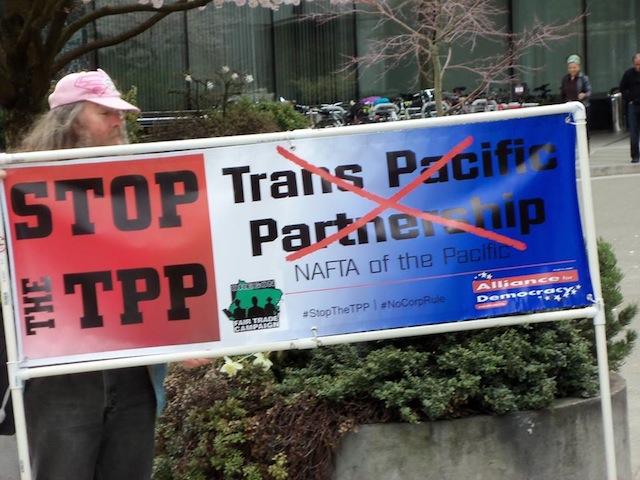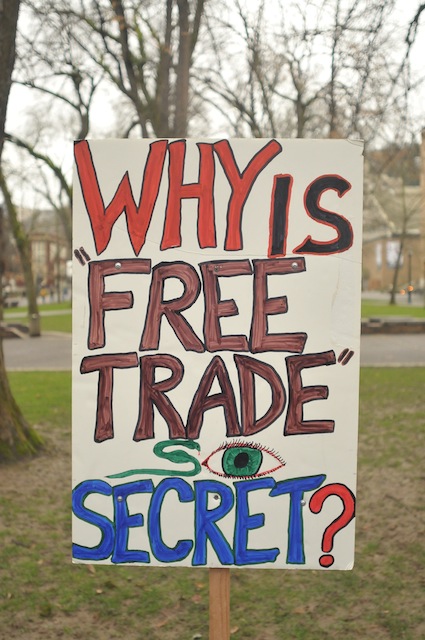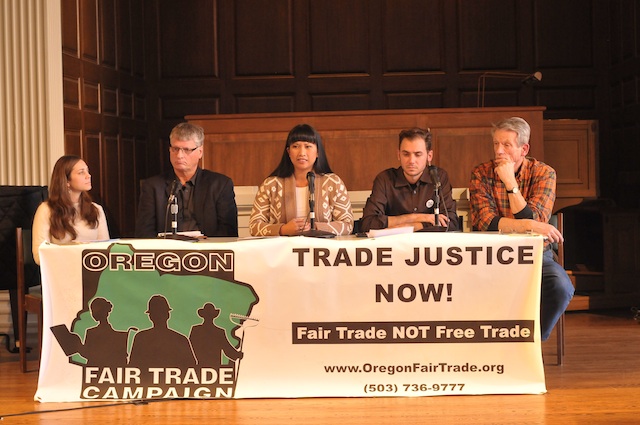
Photo by David E. Delk
Story by Pete Shaw
After last week’s election, the Portland Occupier published a column I wrote about how regardless of who won the election, the same work of organizing for a more just world faced us. Had Hillary Clinton won, she at most would likely have made slightly tepid changes, but I doubt those changes would have done anything to strike at the institutions that have buttressed the many bigotries that have composed a core pillar of the United States since its creation. After all, she was taking huge sums of money from interests who benefit from those institutions. While I do believe in using voting as a tactic–if only to buy time–I absolutely don’t see it as an end, and I fully understand the thinking of folks who are deeply involved in organizing work who do not vote. At the least, voting is a near-meaningless act if you do not have enough people organized to hold accountable the politicians they elect and bend them to your will.
About 4 or 5 years ago I attended a small meeting at the then office of Portland Jobs with Justice on in the AFSCME building on East Burnside. During the course of that meeting, people were speaking about another so-called free trade agreement (FTA) that was coming down the pike, the Trans Pacific Partnership (TPP). The TPP had been in the works for a few years, but not long before this meeting the US and the eleven other involved governments from the Pacific Rim–whose countries’ economies made up over 40% of the world’s gross domestic product–began getting down and dirty in negotiations. Those discussions were being helped along by the corporations that would benefit most–at the expense of people–from the arrangement. And those negotiations were being done in secret, with even members of the United States Congress–the branch of government responsible for dealing with trade–prohibited from knowing their content.
The basic idea of the TPP was the same as prior FTAs: there would be reams of paper that would define the rights of corporations to extract as much profit as possible, as well as some ink giving lip service to environmental, labor, and human rights standards, albeit almost completely devoid of any way to enforce these. It was, as with NAFTA, CAFTA, and the trade accords involving Peru and South Korea, contemptuous of democracy.
And we needed to organize against it.
In early July 2012, the Oregon Fair Trade Campaign (ORFTC) held a rally at Pioneer Square calling attention to the TPP and the threat it posed. It was a gorgeous day, and before it was over, a contingent of about 20 people visited the Verizon store on Broadway, a FedEx in southwest Portland, and a Wal-Mart over in southeast Portland. I remember sitting in the back seat of Greg Margolis’ car, suffering through back and neck spasms, and Greg engaging me in conversation about John Coltrane to help ease the pain. When we got to Wal-Mart, a crowd of at least 50 people was there. It did not relieve my aches, but it sure made me smile. “This is how it works,” I once again thought to myself.

Photo by Pete Shaw
A month later, Senator Ron Wyden convened a “listening session” in Portland to discuss the TPP. He expressed some opposition. It will come as no surprise to anyone who remotely knows Wyden’s stance on FTAs that his opposition was not to the contents of the TPP, but rather that because of the negotiations’ secrecy, he was left out of seeing what progress was being made. By that time, Wikileaks had published some leaks of the proposed text which was predictably horrible. Most of the people on that stage appeared to be happy listening to themselves as they talked up how wonderful the TPP would be for everyone, with that word “everyone” being the usual substitute for “me.” A large number of people in the audience were opposed to the TPP, and I remember seeing new faces.
I should add that a lot of people supporting the TPP were there in particular in the hope that the Northwest would become a haven for shipping coal to China. That fight was gearing up as well, and an obvious bond of solidarity was ready for the making.
From there followed a series of forums called together by the ORFTC that with each successive meeting seemed to bring more people and groups into the fold. Those expanding numbers of people who realized what a debacle the TPP would be for at least some major element of their lives were exerting their influence on politicians.
On January 9, 2014 Democratic Senator Max Baucus, Republican Senator Orrin Hatch, and Republican Representative Dave Camp introduced legislation that would grant President Obama “Fast Track” authority for the TPP. In a nutshell, these leaders were urging their fellow congresspeople to abdicate their constitutional power over matters of trade. It would require an up-or-down vote on the legislation, and it would not allow for amendments.
In March, with Fast Track still not passed, the ORFTC held a rally in front of Wyden’s office. After the rally Elizabeth Swager of the ORFTC hoped to deliver to Wyden a bag of 5 inch floppy computer disks. These disks had long been obsolete, just like Fast Track, a relic from the Nixon Administration. They were not accepted because they posed a “security risk.”
It had been about two years since that Jobs with Justice meeting on Burnside, and still the movement was expanding. More people and groups signing on to the fight. More new faces at the rallies.
June, and yet another forum with yet more allies–these now being held at the First Unitarian Church, not only because that is a friendly space for those seeking justice, but because the numbers of people wanting to get involved had grown so much that the space of the church’s Eliot Chapel was needed–it was announced that in November Wyden planned to put forward his own version of Fast Track that he named Smart Track. The name was the only material difference. That gave people about five months to get the word out and put pressure on Wyden.
Such a task is never easy, but how hard could it be after the outreach and organizing that had occurred over the past few years? I don’t know that answer. I do know that I am pretty sure Wyden never introduced Smart Track because poll after poll showed he would get beaten like a gong for doing so. I’d gloat by writing “smart move,” but in a smarter move, Wyden decided his best bet was to add some of his provisions to Fast Track and then make some talk about the necessity of compromise, leaving out the closing words “by further sacrificing working people on the altar of corporate profits.” Fast Track would eventually pass, but in fights with an opponent whose backers are multi-national corporations worth trillions of dollars, you take every victory you can get. And you build on it. They had made Wyden cave.
In early 2015 Wyden holds a town hall on the PCC campus off SE 82nd Avenue. A large crowed of people opposed to the TPP gather outside and flyer people entering the meeting. They later go in as well. I was planning on heading home because I was feeling ill when I saw a crowd marching toward the campus. It was a Don’t Shoot Portland march that was coming to demand Wyden start working to hold police accountable for murdering people, particularly those of color. The Don’t Shoot people entered and faced off with Wyden. Instead of engaging them in a substantive manner, he uttered some platitudes, but the activists were not going to let him off so easily. They demanded more. Wyden fled, and so members of Don’t Shoot Portland conducted the meeting without Senator Wyden. Some people left, but most stayed. It was not planned this way, and now Wyden had at least two vocal groups of substantial numbers who were giving him heat.

Photo by Pete Shaw
Activists continue following Wyden around, protesting outside his office, and doing the same to Oregon’s other legislators who support the TPP, which includes Portland’s Earl Blumenauer who has a reputation for being prickly. Quite a few years back I was arrested for taking part in a sit-in at Earl’s office, this over the Peru FTA. The anti-TPP activists are visiting his office often now, and I always feel like I am in some way coming home.
The numbers build, as does the pressure. February sees the TPP signed by the 12 negotiating countries. It now awaits ratification from those countries’ governments.
But nobody in the Congress wants to touch the damn thing. President Obama wants it badly. But it is radioactive. Donald Trump and Bernie Sanders are a lot of the rage, if not all of it. They are hitting all the right notes when they talk about trade. Trump is also hitting all the wrong notes on issues of race, gender, faith, and really just about everything not white, male, straight, and Christian. Hillary Clinton is tepid on the trade issue, and nobody is sure where she stands. Not so long ago, she saw the TPP as the cat’s meow. Now she is opposed.
All politicians flip-flop, but Clinton has been dragged through the mud for so long by the Republicans and the corporate media that she likely feels she cannot make the stand against the TPP that Sanders does because she will lose her conservative Democrat base which includes the many multinational corporations that will benefit from the TPP. Clinton eventually beats Sanders for the Democratic nomination, but Trump wins the presidential election.
A week ago the word came out that, at least for the moment, the TPP was dead. The Republicans had announced they would not seek to pass it through the lame duck session. A couple of days ago, President Obama also announced its demist. My friend Arthur Stamoulis, who was once the lead organizer for the ORFTC and now is the Executive Director of the Citizens Trade Campaign, recently noted that while much of the corporate media place credit for stopping the TPP at the feet of Donald Trump, the reality is that it is the years of people relentlessly educating and organizing people and a multitude of various groups against it that is responsible for at least momentarily bringing down the curtain on the TPP.
It seems a perfect story at this moment, or really–considering that much of the fight was against the wishes of Democrat President Obama– at any time. The real work of creating a more just world does not lie in casting ballots, but in organizing people.
It is the only thing that has ever worked.






